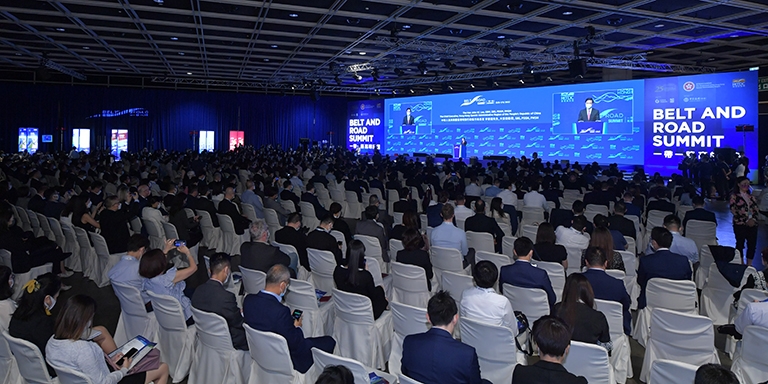Hong Kong’s hub and connector status – serving as a gateway between Mainland China and the rest of the world, and a pivot point for the Guangdong-Hong Kong-Macao Greater Bay Area (GBA) and the new Regional Comprehensive Economic Partnership (RCEP) – makes the city a natural focus point for the Belt and Road Initiative.
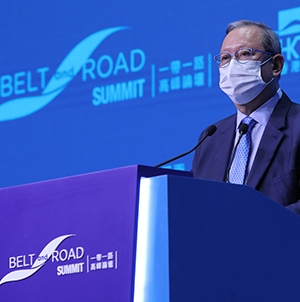
As ties between Asian and global economies begin to revive following the COVID-19 stall, the seventh Belt and Road Summit, jointly organised by the Government of the Hong Kong Special Administrative Region (HKSAR) and the Hong Kong Trade Development Council (HKTDC), was held in hybrid mode this year. All the first day’s sessions were open to physical attendees as well as streamed online, while the second day was entirely digital.
Continuing in the tradition of being a formal, substantial and high-quality event, the summit saw state leaders and senior officials, regional government leaders and business leaders gather to explore the business potential of the Belt and Road Initiative, and to drive synergies and create a win-win situation through multilateral cooperative ventures such as the GBA and RCEP.
As one of the major celebrations to mark the 25th anniversary of the establishment of the HKSAR, the summit saw more than 80 senior government officials and business leaders from the Belt and Road region gathered to share their insights under the theme “Heralding a New Chapter: Collaborate and Innovate”. For the first time, the summit was held in a hybrid format, overcoming geographical boundaries by allowing those who were unable to attend in person to participate virtually. More than 19,000 attendees representing over 80 countries and regions participated either online or at the physical event.
Collaboration opportunities
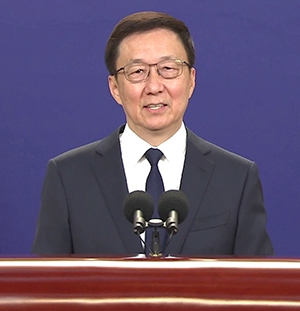
Multilateral collaboration boosts cross-border trade and investment and is becoming more important than ever in driving a strong recovery in the Asia-Pacific region following the pandemic. The RCEP, which came into effect this year, stands as the largest free trade agreement in history, accounting for 30% of the world's population and GDP. Combined with the joint effort of more than 180 countries connected through the Belt and Road Initiative, it will further strengthen regional economic integration around the world.
In the Business Plenary titled “Collaborate for a Bright New Era", business leaders from economies along the Belt and Road and the RCEP shared insights and explored how these initiatives and agreements can complement each other to drive strong economic growth and promote cross-border collaboration between businesses of all sizes.
Sharing his views on current issues, John Key, the 38th Prime Minister of New Zealand, said: “One of the things that are challenged is the supply chains. Mainland China is a really a huge market, and we source a lot of goods from Mainland China. We can see the impact the breaking down of those supply chains has had on global inflation.”
Aswin Techajareonvikul, Chief Executive Officer and President of Berli Jucker Public Company Limited, said enterprises in Thailand recognised the potential of the Belt and Road Initiative. “It is in tune with our 20-year strategy and Thailand’s ongoing projects for economic development under the Thailand 4.0 economic model. We are able to expand trade and investment to our neighbouring countries. We can also better link with the world market, especially for the CLMV countries [Cambodia, Laos, Myanmar and Vietnam].”
Liu Liange, Chairman of the Bank of China, said: “Most of the members in the RCEP are located in important junctions along the Belt and Road. This not only fosters connectivity between value chains and supply chains, but also further expands the ‘social circle’ of the Belt and Road Initiative, engaging more countries and businesses in the construction of the Belt and Road and in broader collaboration, as well as forming the dual-engine of the Belt and Road Initiative and RCEP within the region.”
Infratech development
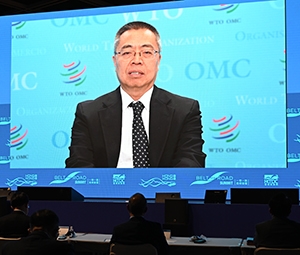
Global economies are pushing to achieve post-pandemic economic recovery. At the same time, countries around the world are striving to build stronger global business connections with the help of macro measures such as the Belt and Road, the RCEP and the GBA development.
The demand for high-quality, innovative and sustainable infrastructure around the world has given rise to many new business opportunities. These innovative projects will be led and driven by visionary industry leaders as they usher in a new era of infrastructure development. In the "Faster, Greater Infrastructure" session of the thematic group discussions, business leaders who had turned futuristic concepts into reality and envisioned some of the world's most important infrastructure projects exchanged their views.
Founder and Managing Director of Emaar Properties and Founder and Director of Noon.com, HE Mohamed Ali Rashed Alabbar, said: “I really believe that a link such as the Belt and Road Initiative and its effects on human life, economic progress, quality of life, job creation and exchange of cultures and knowledge and unity to the world – it is going to be incredible.”
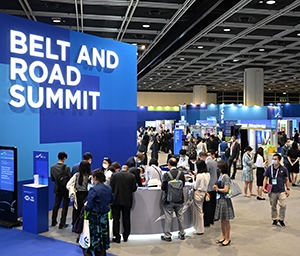
Chief Marketing Officer of Hyperloop TT Robert Miller addressed the current trends in infrastructure technology (infratech) development. “Infratech is really underfunded and underdeveloped. Hyperloop really falls into the category of infratech where there is a longer time to profitability. So we need patient investors from both public and private sectors. Meanwhile, governments everywhere are looking at reducing carbon emissions.”
Mr Miller explained that one of the biggest polluters is the transportation industry, with 23% of all carbon emissions worldwide coming from transportation. “Europe, the United States and countries in Asia are all looking at how to decarbonise the transportation industry. Hyperloop TT could be a massive driver in that decarbonisation,” he said.
The seventh Belt and Road Summit was made possible by its Strategic Partner, China International Capital Corporation (CICC); Regional Banking Partner, Bank of China (Hong Kong); and Platinum Sponsors, China Mobile International and China Unicom.
Related link
Belt and Road Summit
